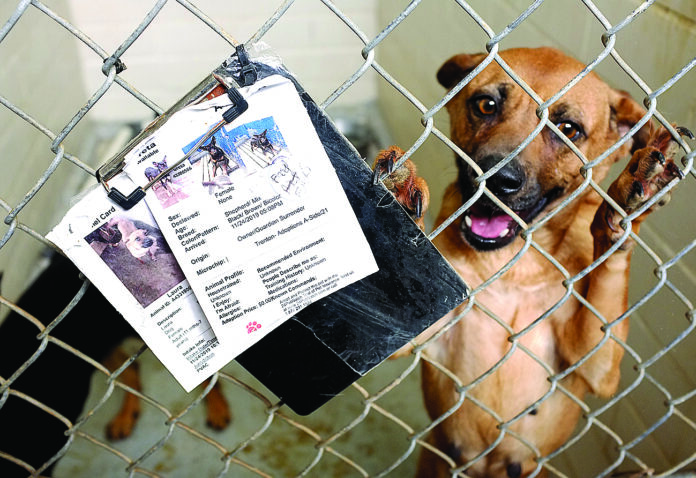EDINBURG — What’s one upside to being in COVID-19 imposed self-isolation for weeks?

Stephanie Baggett, adoption specialist team leader, interviews potential adoption parents Tuesday at the Palm Valley Animal Society in Edinburg.
According to Mike Bricker with Palm Valley Animal Society, it’s that you’ve suddenly got enough time to foster a litter of puppies.
“We’re getting a bunch of foster parents, people who aren’t able to go into work, so they’re taking a group of puppies or a group of kittens from us and they’re spending their quarantine with some new friends. It’s cool,” Bricker, PVAS’ interim executive director, said.
Like organizations everywhere, PVAS finds itself grappling with a host of obstacles brought on by new regulations implemented because of the pandemic and its potential to spread through the community.
Despite that, Bricker said the shelter’s save rate has remained relatively static: in January it was a record 90%; it’s on track to be 88% for March.
“It’s really hard for us to do the same things we used to do. We used to do 19 or 20 adoptions every single day, so that number has decreased a bit because people can’t come and look at our animals,” he said.
What has helped, Bricker said, is fostering. PVAS currently has about 135 animals in foster homes.
“That’s all thanks to the community, they continually get those animals out safely. Plus we continue to do some transfers, sending some animals up to San Antonio,”
Changes have been made at PVAS to prevent the spread of the virus at its facilities. Many employees wear gloves and masks, and the shelter has switched to curbside adoption, although a single family at a time is still allowed to enter the building and look at the animals.

New policies on social distancing are in effect at the Palm Valley Animal Society in Edinburg.
“Most of it is done over the phone,” Bricker said. “We’ll do the adoption counseling session just over the phone, and then we’ll bring your paperwork out to your car to sign and then your dog or cat soon after.”
Steps have also been taken to protect staff and volunteers, and to make sure the shelter continues to function if there’s a case of the coronavirus confirmed in the facility.
“We’ve split up staff into an A and B staff schedule, so in the event that everybody does get sick we don’t lose 100% of the staff,” he said. “We’re only allowing volunteers to come in on certain days, certain hours, and we’re making sure everyone’s keeping a safe distance as well.”
Despite those measures, the pandemic has created other hurdles that make running PVAS more difficult. Staffing the shelter is an issue, Bricker said.
“People are worried about coming to work, people are worried about getting infected,” he said. “We stopped volunteer orientations because those are large groups, so we’re not getting new volunteers right now.”
Bricker said that the largest impact the pandemic has had on PVAS is financial.
“The biggest challenge has been that donations have definitely slowed in a big way. We were unable to do any events that we usually do as far as getting donations. On weekends we used to go out to different restaurants and parks and stuff, set up and get donations that way. We haven’t been able to do that obviously,” he said. “Another big thing, we have those little donation boxes in probably 70 or 80 businesses locally. Since no one’s going in, no one’s donating. That’s where we’ve seen our biggest hit right now.”
According to Bricker, financial donations are instrumental in signing up those foster homes for adoptions.
“People want to help, but when it becomes financially cumbersome, they want to return the animal. So we love to be able to buy food and crates and litter pans and litter, all the things that fosters need, so that way they don’t have to go out and buy it,” he said.
PVAS has attempted to compensate for that with more videos and posts on social media, Bricker said, in the hopes of keeping fostered pets from being brought back to the shelter.
“Everybody’s in a difficult time right now so it’s hard to even ask, but it’s something that as a nonprofit we rely on,” he said.
Bricker said the shelter has also turned to social media to promote other initiatives that are geared toward increasing adoptions.
“We also have a promotion called ‘Love is Blind.’ You actually give us a call, the number is listed online, tell us exactly what you’re looking for in a dog or cat, we’ll find a match and then we’ll surprise you, that’s pretty cool, too,” he said.
Bricker said that as a result of being in contact with other shelters from some of the places in the nation that were first affected by COVID-19, PVAS has been able to prepare for its impact.
“Thankfully it hit this area a little later than most, so we were able to learn from other people’s mistakes, and really learn what worked and what didn’t,” he said. “For the past few weeks I’ve been on the phone with shelters around the country.”




